The heating, ventilation, and air conditioning (HVAC) market has been experiencing a ton of growth in the last several years. This exponential growth has caused contractors working in HVAC to wonder how to start an HVAC business of their own. After all, you’ll reap more rewards if you work to grow your own business rather than someone else’s.
However, starting an HVAC business presents a myriad of choices. Which sector should you focus on? What type of technology should you implement? What licenses and permits do you need?
If you’re considering starting an HVAC business and want the answer to these questions, we’ve got you covered. This article will detail everything you need to know about how to start an HVAC business from the ground up. So, let’s get started!
Why start an HVAC business?
Starting a business is a lofty endeavor, no matter what industry you’re in, and it’s not for everyone. For some HVAC technicians, it’s easier to just work for an established company and collect a paycheck. This route would mean none of the operational headaches that come along with owning a business. So why should you consider starting an HVAC business? There are several reasons, but the consistent growth of the HVAC industry is one of the most relevant.
By the end of 2024, the global HVAC market was valued at 281.7 billion USD. Moreover, analytics predict a compound annual growth rate (CAGR) of 6.7% from 2024 to 2029. That makes HVAC an already lucrative field with plenty of growth ahead. These forecasts mean there is a lot of money to be made by HVAC business owners.
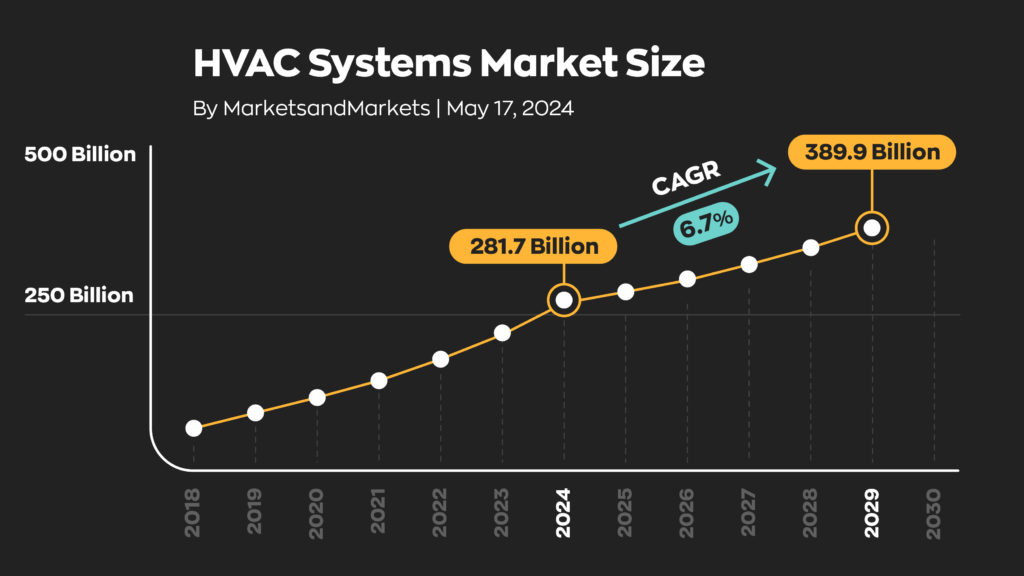
There’s a number of factors driving the HVAC market’s consistent growth. The most relevant one is the industry’s evergreen nature, which generates a constant demand for HVAC services and systems. Whether it’s hot, cold, dry, or humid, where there’s people, there will be demand for an HVAC business. It’s one of the reasons that HVAC companies can generally do very well for themselves.
Another factor to consider if you’re wondering how to start an HVAC business is the ever-growing technological advancements. The HVAC industry constantly releases new systems that offer increased efficiency, greater control, and other features. These regular development cycles allow HVAC installers to regularly expand their services and products.
Once in place, these systems will also need maintenance, allowing your business to provide continued support to clients beyond installation. This ability to naturally create recurring revenue streams is a very attractive prospect for any business, HVAC or otherwise.
Problems with starting an HVAC business?
Of course, just as there are reasons to start an HVAC business, there are reasons to stay away. Part of it has to do with the dynamic of being a business owner instead of an employee. There’s a certain freedom that comes with being an HVAC technician rather than a business owner. Not to mention, some people excel when they work under someone else’s direction.
Being a business owner brings a lot more responsibilities. You’re the one making final decisions, and not just on business direction, either. Marketing, advertising, how your technicians deal with customers—everything is on your shoulders. Some people thrive under that sort of pressure, but others fold.
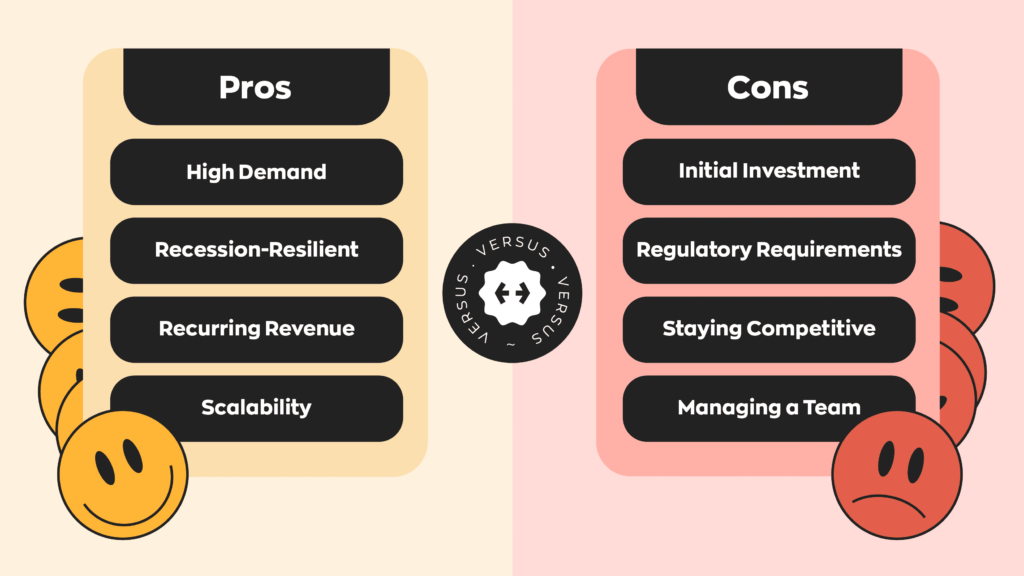
And even if you are the sort of person who thrives under pressure, running an HVAC business can be challenging. It’s not like running a retail business that operates from a central location.
HVAC, being a field service, brings all sorts of complications. Technicians will be in and out the door, operating all across the local region. Every job site will need different tools and components and require unique solutions. That’s a lot of moving parts to keep track of.
If we haven’t scared you away, and you’re still wondering how to start an HVAC business, here’s where to start.
How to start an HVAC business
Before you register a business, be sure to do your research. This goes doubly for HVAC. Some of the materials HVAC technicians work with are dangerous.
A hazardous work environment means more special licenses and insurance. What you need may differ depending on local or even international legislation. Be sure to check all your boxes before starting any real work. Once everything is squared away, the process will look something like this.
Decide on an HVAC sector to focus on
The HVAC industry has three main sectors, each with its own benefits and challenges. Those segments are residential, commercial, and industrial. Residential deals with homes, commercial deals with commercial spaces like office buildings and storefronts, and industrial deals with large-scale facilities such as factories or data centers.
You don’t have to focus on a single sector, but it can benefit your marketing efforts if you do. After all, if you have proven experience working within a specific sector, clients will have more faith in your company.
Register and obtain licenses and insurance
It’s essential to register as the correct “type” of business. Generally, that’s decided by how many people have a stake in the company at the time of founding. If you’re the only owner, it’s a sole proprietorship, and two or more are partnerships.
Registering as a limited liability company (LLC) is also possible if you’re especially worried about liabilities. Whichever direction you take, be sure to renew your business license annually.
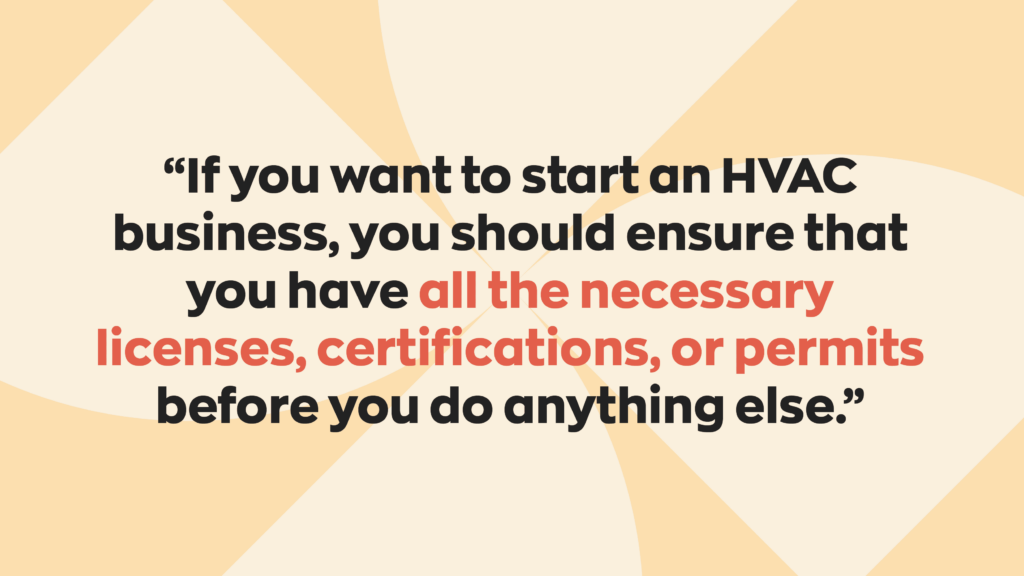
In most places, you’ll also need an HVAC certification and license in order to start an HVAC business. The requirements differ depending on location, and some countries may even require university-level courses.
Create a business plan
Starting a business without a plan is a bad idea. No one’s funds are truly limitless, and not accounting for growing pains is a good way to burn through capital. This means you’ll have to figure out startup costs and other key factors ahead of time.
Ultimately, your startup costs will decide what services your HVAC business offers. Funds decide your equipment, and your equipment decides your available services.
It’s also important to do some competitive research into other HVAC businesses in your area. Find out what’s working, what’s not, and what services people lack. This research will also help form marketing strategies and set prices.
Purchase equipment and materials
Once you finish all of that, it’s time to get your equipment and materials. Note that equipment encompasses much more than just wrenches and hammers. Technicians will need personal protective equipment (PPE) and more advanced tools like thermal cameras and leak detectors.
This will also include the necessary space, including a physical storefront (if necessary) and a warehouse to store your equipment and components. You’ll also need to factor in your service vehicles. For field service workers, these trucks will often double as storage spaces for tools and equipment.
Find a team you trust
Residential HVAC technicians work on people’s most valuable possessions: their homes. They’re also a customer-facing part of the business. Finding reliable, knowledgeable technicians with a strong work ethic is vital to success. They’ll pave the way for forging strong customer relationships.
Running your HVAC business
Now that you know how to start an HVAC business, the next step is running it. Specific needs will differ from company to company, but the overarching needs usually stay the same. Here’s a few parts of running an HVAC business that you should be wary of:
- Inventory management— Strict inventory management practices are necessary for field service, as HVAC components and equipment can be expensive. Tracking equipment flow is just one part of it, though. It’s also important to track equipment when it’s out in the field. Knowing where it is at what time is crucial for scheduling. Good field service management software should also restrict user access. This will help prevent things like lost and stolen inventory.
- Marketing— Starting an HVAC business isn’t enough to find customers or clients. You need to ensure they know about you first, which means marketing. And once you find them, go the extra mile to keep them. They’ll provide recurring revenue and hopefully spread awareness by word of mouth.
- Relationship management—Strong customer relationships are the backbone of any successful business. However, HVAC owners have to manage other relationships as well. Staying on good terms with the individual suppliers that sell equipment and components is crucial. Sometimes, taking a financial loss is alright if it allows you to strengthen a new partnership.
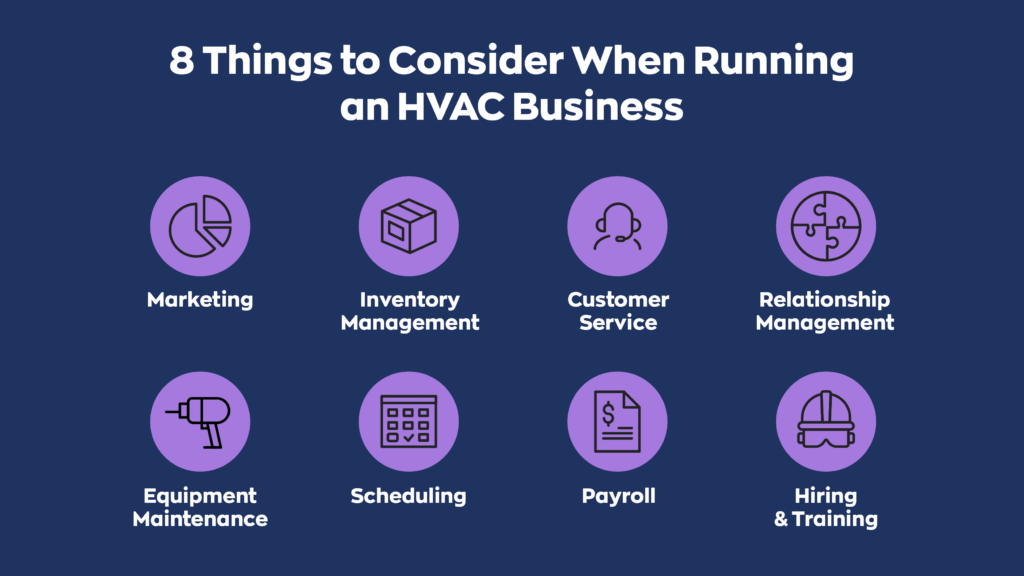
Use the right tools
Knowing how to start an HVAC business is just the beginning. Running a business requires keeping track of things. That’s even more true for field services. You’ll have to compare schedules to create routes for technicians on top of managing normal business stuff. Before computers were accessible, people were forced to use spreadsheets or pen and paper for everything. In fact, many still do.
Today, though, we have software. Business-oriented solutions automate menial, time-consuming tasks so you can focus on what matters. Our software, inFlow, offers a perpetual inventory system to track inventory levels and equipment on the go.
Our software can help out with a lot more, as well. For instance, inFlow has integrations with other popular software solutions your business will likely need, such as QuickBooks Online, Xero, and EasyPost. We also offer billing and invoicing, reorder points and barcodes! What’s not to love?
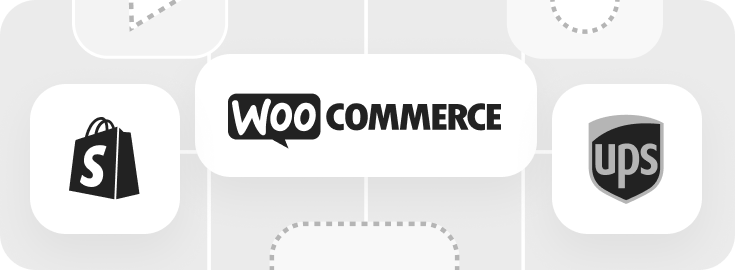





0 Comments